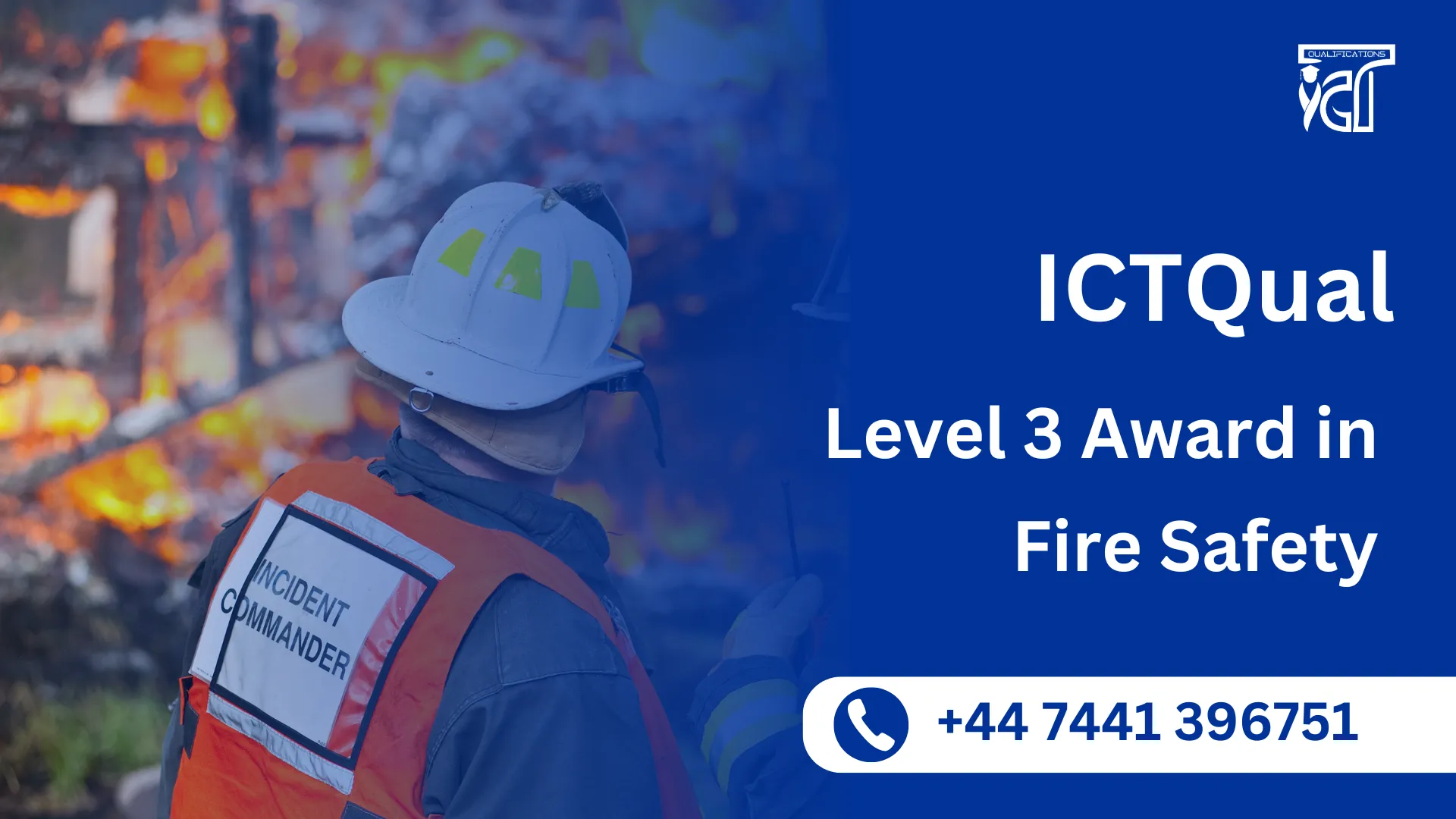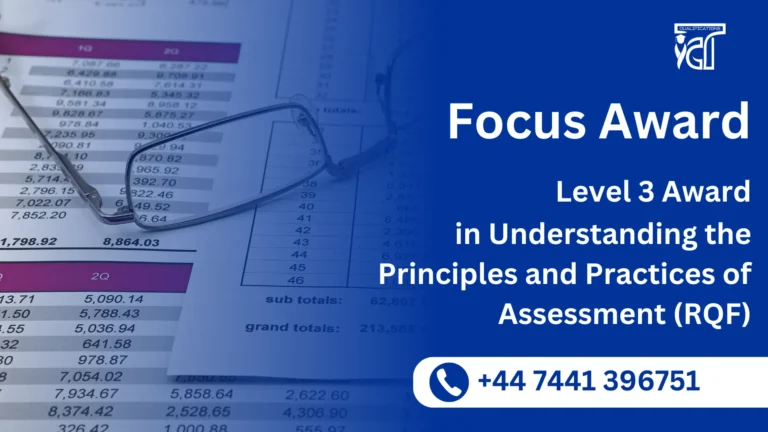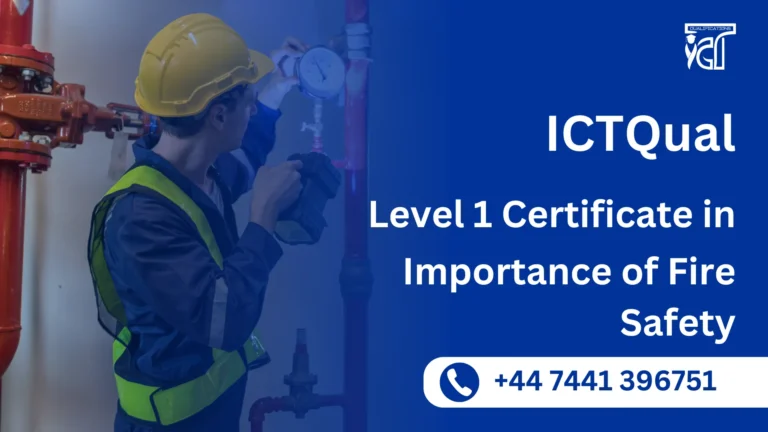Fire safety is not just a legal requirement but a fundamental aspect of workplace safety that helps prevent loss of life, injury, and property damage. For individuals responsible for ensuring fire safety in the workplace, gaining in-depth knowledge and skills is essential. The ICTQual Level 3 Award in Fire Safety is designed to provide comprehensive training for fire safety officers, health and safety managers, supervisors, and other professionals responsible for fire safety. This advanced qualification equips participants with the expertise to manage fire risks effectively and lead fire safety efforts within their organizations.
The ICTQual Level 3 Award in Fire Safety is an advanced fire safety qualification aimed at those who are responsible for managing fire safety in the workplace. It provides participants with in-depth knowledge of fire risk assessment, fire safety law, fire prevention strategies, and emergency response planning.
This qualification is ideal for health and safety managers, fire safety officers, or anyone tasked with fire risk assessments, ensuring compliance with fire safety legislation, and leading fire safety initiatives in the workplace. Upon completion, individuals will be equipped to implement, monitor, and improve fire safety standards within their organization.
The ICTQual Level 3 Award provides an advanced, thorough understanding of fire safety management. It covers crucial areas such as fire risk assessments, fire prevention strategies, emergency procedures, and the implementation of fire safety plans. This knowledge allows participants to effectively manage and mitigate fire risks in complex workplace environments.
Fire safety is critical in any workplace, and the ICTQual Level 3 Award in Fire Safety provides the advanced training needed to take on a leadership role in fire risk management. Whether you’re a fire safety officer, health and safety manager, or supervisor, this qualification will equip you with the expertise to implement effective fire safety strategies and ensure the well-being of your employees.
ICTQual Level 3 Award in Fire Safety
Following are the study units of ICTQual Level 3 Award in Fire Safety.
- Principles of Fire Safety
- Fire Safety Legislation and Regulations
- Fire Risk Assessment and Management
- Fire Safety Management Systems
- Fire Detection and Alarm Systems
- Emergency Evacuation Procedures
- Firefighting Equipment and Systems
- Practical Fire Safety Exercises
GLH (Guided Learning Hours) and TQT (Total Qualification Time) are terms commonly used in vocational qualifications to help define the amount of time a learner is expected to spend on their studies.
1. GLH (Guided Learning Hours)
GLH refers to the number of hours a learner spends being directly taught, supervised, or supported during their course. This includes the time spent in activities such as:
- Classroom instruction
- Practical workshops
- One-on-one tutoring or mentoring sessions
- Online learning sessions with tutor support
In other words, GLH represents the time that learners are actively engaged with their instructors or learning activities.
2. TQT (Total Qualification Time)
TQT represents the total amount of time a learner is expected to invest in completing a qualification, including:
- GLH (Guided Learning Hours): Time spent on direct learning, as explained above.
- Self-Directed Learning: This includes time spent on independent study, research, assignment completion, preparation for exams, and any other work the learner does outside of direct teaching hours.
TQT is a broader measure that includes all the time required to achieve the qualification. It helps learners and employers understand the overall commitment required for the qualification.
Key Differences Between GLH and TQT:
- GLH focuses on direct learning with guidance or supervision.
- TQT includes GLH as well as independent study time and other learning-related activities.
Example:
If a qualification has a TQT of 600 hours and a GLH of 250 hours, it means the learner should spend 250 hours in direct learning (classroom, online, or tutor-led sessions) and 350 hours on independent study or research.
Here are the learning outcomes for each study unit of Level 3 Award in Fire Safety:
1. Principles of Fire Safety
- Understand the fundamental principles of fire dynamics, including the fire triangle and tetrahedron.
- Identify common fire hazards in various environments and assess their potential risks.
- Implement effective fire prevention strategies to minimize the likelihood of fire incidents.
- Demonstrate knowledge of fire behavior and the factors that influence fire spread.
2. Fire Safety Legislation and Regulations
- Explain the key legislation, regulations, and standards governing fire safety in workplaces and public spaces.
- Outline the responsibilities of employers, employees, and other stakeholders in ensuring compliance with fire safety laws.
- Evaluate the consequences of non-compliance with fire safety regulations.
- Develop strategies to maintain legal compliance and promote a culture of fire safety within organizations.
3. Fire Risk Assessment and Management
- Conduct thorough fire risk assessments using systematic approaches to identify and prioritize potential fire hazards.
- Implement appropriate risk control measures to mitigate identified fire risks effectively.
- Develop and maintain accurate records of fire risk assessments and regularly review and update them.
- Design comprehensive fire emergency plans tailored to specific environments and scenarios.
4. Fire Safety Management Systems
- Establish robust fire safety policies and procedures aligned with organizational goals and regulatory requirements.
- Organize and deliver effective fire safety training programs to educate personnel on prevention and response protocols.
- Monitor and audit fire safety practices within organizations to ensure adherence to established policies and procedures.
- Implement continuous improvement initiatives to enhance the effectiveness of fire safety management systems.
5. Fire Detection and Alarm Systems
- Identify different types of fire detection systems and their applications in detecting early signs of fire.
- Explain the activation process of fire alarms and the appropriate responses upon alarm activation.
- Perform regular testing and maintenance of fire detection and alarm systems to ensure reliability and functionality.
- Integrate fire detection systems with other building systems to enhance overall safety and response capabilities.
6. Emergency Evacuation Procedures
- Plan and design evacuation routes and assembly points to facilitate safe and orderly evacuation during fire emergencies.
- Conduct regular evacuation drills and exercises to familiarize occupants with evacuation procedures and routes.
- Address the specific needs of vulnerable individuals and ensure their inclusion in evacuation planning.
- Implement post-evacuation procedures to account for all personnel and coordinate emergency services as needed.
7. Firefighting Equipment and Systems
- Identify and describe the different types of fire extinguishers and their appropriate uses based on fire classifications.
- Demonstrate proficiency in basic firefighting techniques and procedures for using fire extinguishers effectively.
- Explain the operation and maintenance requirements of automatic fire suppression systems, such as sprinkler systems.
- Coordinate and deploy emergency response teams effectively in firefighting scenarios to minimize fire damage and ensure safety.
8. Practical Fire Safety Exercises
- Participate in simulated fire scenarios to apply theoretical knowledge and practice emergency response procedures.
- Engage in role-playing exercises to enhance decision-making, communication, and teamwork during fire emergencies.
- Conduct debriefing sessions following practical exercises to evaluate performance, identify strengths, and areas for improvement.
- Analyze case studies of real-life fire incidents to extract lessons learned and apply them to future emergency situations.
By achieving these learning outcomes, participants will acquire the necessary knowledge, skills, and confidence to effectively manage fire safety in diverse settings. This qualification prepares individuals to contribute proactively to fire prevention, emergency response, and overall safety management within their organizations and communities.
Here are the key benefits of the ICTQual Level 3 Award in Fire Safety:
1. In-Depth Knowledge of Fire Safety Management
The ICTQual Level 3 Award in Fire Safety provides an advanced level of knowledge and understanding of fire safety management. It covers essential topics such as fire risk assessments, fire prevention strategies, emergency procedures, and the legal frameworks that govern fire safety, ensuring that participants are well-equipped to manage fire risks in the workplace effectively.
2. Specialized Fire Risk Assessment Skills
One of the core benefits of this qualification is the ability to conduct comprehensive fire risk assessments. Participants learn how to identify potential fire hazards, evaluate risks, and implement preventative measures. This expertise is vital for reducing fire hazards and ensuring workplace safety.
3. Enhanced Compliance with Fire Safety Legislation
Understanding and adhering to fire safety regulations is crucial for any organization. The ICTQual Level 3 Award provides knowledge of fire safety legislation, such as the Regulatory Reform (Fire Safety) Order 2005, enabling participants to ensure their organization’s compliance with legal requirements and avoid costly penalties.
4. Leadership and Management Skills
This qualification goes beyond fire safety knowledge by helping participants develop key leadership and management skills. They will learn how to take charge of fire safety initiatives within an organization, supervise fire safety teams, and train employees on fire safety practices. This prepares them for roles such as fire safety managers or health and safety officers.
5. Practical Emergency Response Training
The course focuses on preparing participants for real-world fire emergencies by teaching practical emergency response procedures. Learners will gain valuable experience in managing evacuation plans, using fire-fighting equipment, and ensuring that all employees know their roles during a fire emergency, which is critical for minimizing damage and ensuring safety.
6. Improved Workplace Safety Culture
By completing the ICTQual Level 3 Award, participants will have the tools and knowledge to create and nurture a strong fire safety culture within their organization. This includes training employees on fire safety measures, conducting regular fire drills, and ensuring everyone in the workplace knows what to do in the event of a fire.
7. Recognized Certification
The certification awarded after completing the ICTQual Level 3 Award is nationally recognized and respected within the industry. It validates the participant’s expertise in fire safety management and enhances their career prospects, opening doors to advanced roles in health and safety management.
8. Comprehensive Fire Safety Strategy Development
Participants gain the expertise needed to develop and implement comprehensive fire safety strategies tailored to their organization. This includes creating fire safety policies, ensuring adequate fire protection measures are in place, and monitoring the effectiveness of fire safety programs.
9. Cost-Effective Training for Advanced Fire Safety Knowledge
This qualification is a cost-effective way for businesses to provide advanced fire safety training for their teams. It offers a comprehensive learning experience that enables organizations to manage fire safety internally, reducing the need for external consultants or frequent emergency response interventions.
10. Career Advancement Opportunities
The ICTQual Level 3 Award in Fire Safety is a valuable asset for career development. For individuals already working in health and safety roles, it enhances their credentials, allowing them to pursue more senior positions such as fire safety officer, fire safety manager, or health and safety manager.
The ICTQual Level 3 Award in Fire Safety is a comprehensive, advanced qualification that provides individuals and organizations with the expertise required to manage fire safety risks effectively. It not only improves workplace safety but also enhances compliance with legal standards, ensuring a safer, more secure environment for employees.
The ICTQual Level 3 Award in Fire Safety is an ideal course for individuals who are responsible for managing fire safety in the workplace and want to take their skills to the next level. This qualification is best suited for:
1. Fire Safety Officers
Professionals who oversee fire safety within an organization will benefit from this advanced qualification. It equips them with the knowledge and skills needed to conduct thorough fire risk assessments, develop fire safety policies, and lead fire safety initiatives across the workplace.
2. Health and Safety Managers
For health and safety managers, the ICTQual Level 3 Award in Fire Safety provides in-depth expertise in fire safety regulations, risk assessment procedures, and emergency response management. This is particularly valuable for those overseeing broader health and safety compliance efforts within an organization.
3. Facilities Managers
Facilities managers responsible for the maintenance of buildings and workspaces can use this course to improve fire safety standards in their facilities. By gaining knowledge of fire risk assessment, prevention measures, and emergency protocols, they can ensure a safer working environment for all employees.
4. Supervisors and Team Leaders
Supervisors and team leaders tasked with overseeing fire safety practices and ensuring that fire safety policies are followed within their teams will find this course highly beneficial. It will empower them to manage fire safety efforts effectively and provide guidance to staff during emergencies.
5. Risk Assessment Professionals
Individuals working in risk assessment roles or responsible for evaluating safety protocols can expand their expertise with the ICTQual Level 3 Award in Fire Safety. It offers advanced knowledge in fire risk assessments, helping professionals implement best practices and reduce fire-related hazards.
6. Individuals Aspiring to Leadership Roles in Fire Safety
This course is perfect for individuals looking to advance their careers in fire safety management. With a focus on leadership, compliance, and strategic fire safety planning, it provides the essential qualifications needed for senior roles, such as fire safety manager or director of health and safety.
7. Organizations Seeking to Ensure Fire Safety Compliance
For organizations aiming to meet fire safety legislation requirements, this qualification is crucial. It ensures that those in charge of fire safety are well-equipped to protect employees, minimize risks, and adhere to legal fire safety standards, ultimately contributing to a safer, more compliant workplace.
In short, the ICTQual Level 3 Award in Fire Safety is the best fit for professionals who have a responsibility for fire safety management in their workplace, especially those looking to develop leadership capabilities and implement robust fire safety protocols. Whether you’re already in a managerial or safety role or aiming to move up in your career, this qualification will provide you with the advanced skills and knowledge necessary to lead and improve fire safety measures in any organization.
Entry Requirements
Register Now
Qualification Process
Qualification Process for the ICTQual Level 3 Award in Fire Safety
- Self-Assessment:
Begin by evaluating your eligibility to ensure you meet the qualification requirements, including work experience, knowledge, and language proficiency. - Registration:
Complete your registration by submitting the required documents, including a scanned copy of a valid ID, and paying the registration fee. - Induction:
An assessor will conduct an induction to confirm your eligibility for the course and explain the evidence requirements. If you do not meet the criteria, your registration will be canceled, and the fee will be refunded. - Assignmnets & Evidence Submission:
Provide all assignmnets and the necessary evidence based on the assessment criteria outlined in the course. If you are unsure of the required evidence, consult with the assessor for guidance on the type and nature of evidence needed. - Feedback and Revision:
The assessor will review your submitted evidence and provide feedback. Evidence that meets the criteria will be marked as “Criteria Met,” while any gaps will be identified. You will be asked to revise and resubmit if needed. - Competence Evidence:
Submit final evidence demonstrating that all learning outcomes have been met. This evidence will be marked as “Criteria Met” by the assessor once it is satisfactory. - Internal Quality Assurance (IQA):
The Internal Quality Assurance Verifier (IQA) will review your evidence to ensure consistency, quality, and compliance with standards. - External Verification:
The IQA will submit your portfolio to ICTQUAL AB External Quality Assurance Verifiers (EQA) for final confirmation. The EQA may contact you directly to verify the authenticity of your evidence. - Certification:
Upon successful completion of all checks, ICTQUAL AB will issue your official certificate, confirming that you have attained the ICTQual Level 3 Award in Fire Safety.







